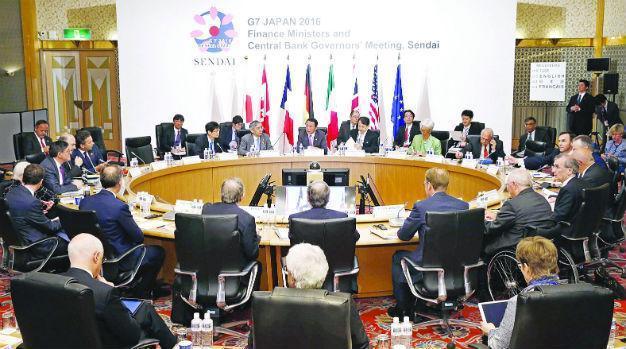G-7 finance leaders seek to reassure on global economy
AKIU - The Associated Press

AP photo
Finance leaders of major industrial countries meeting in Japan need to find ways to use all the “policy levers” they have to help counter anxiety over global economic prospects, U.S. Treasury Secretary Jacob Lew said May 20, in remarks echoed by his Japanese hosts.
The consensus was that while there is no one-size-fits-all approach, all economies are facing a stifling lack of demand, and the private sector must play a pivotal role in helping spur growth.
Finance ministers and heads of central banks of the Group of Seven spent May 20 discussing ways to use monetary policy, government spending and longer-term reforms to help support growth.
“The G-7 is meeting at a significant time not because it’s a time of crisis, but it’s a time when there’s a lot of uncertainty in the global economy and there a need for us to talk to each other about what we’re seeing and what tools we have to use to promote the most balanced use of all the policy levers that we have,” Lew said in a briefing.
“I certainly hope the meetings we’re having here in Sendai have that effect in terms of the G-7 conversations,” he said.
Lew said he hoped the talks would keep on track commitments made during recent discussions in China by the wider Group of 20 major economies, where members pledged to not manipulate exchange rates to their own advantage.
A recent rise in the value of the Japanese yen against the U.S. dollar is adding to pressures on Japanese companies who had reaped record profits as the yen weakened in recent years, fattening earnings brought back to Japan in yen terms.
Japanese Finance Minister Taro Aso reiterated Tokyo’s desire to keep exchange rates stable, but also its commitment not to engage in “competitive devaluation of currencies.”
He told reporters that there was a recognition at the meeting that each country faces its own particular challenges and circumstances and must adapt policies to suit them. Some, like Japan, need to spend but are constrained by mounting public debts and need the private sector to do more.
“The difference between countries is such that there are those that may or may not have sufficient financial room, and those that have room but cannot implement as it is set by the law,” Aso said.
“There are such countries, so we don’t unilaterally force things, we cannot and we don’t do that.”
Refugee crisi, terrorism
Japan’s government has struggled to convince businesses to invest, and to raise wages, at a time when the population is shrinking and rapidly aging. Companies that recently have enjoyed record profits thanks to lavish monetary easing have preferred to hold onto their cash piles or to invest overseas.
That has constrained demand, as consumers with limited purchasing power and savings opt not to spend more than they absolutely must.
“We as G-7 believe the biggest economic problem is demand. Demand, there is no demand, and that is the biggest problem around the world,” Aso said.
One looming problem for Japan is whether or not to raise its national sales tax next year from 8 percent to 10 percent. Aso has said the tax hike will go ahead barring any major crises or disasters.
But a senior U.S. Treasury official said it would be unfortunate if the sales tax hike ends up being a drag on the economy. The official, who spoke on condition he not be further identified, said “offsets,” such as other tax breaks, might be needed to compensate for the tax hike, to prevent a serious downturn. Japanese officials have also said they fear raising the tax will hurt demand to the extent it could reduce rather than increase government revenues. Most of the governments of the G-7 favor more pro-active government spending to help support flagging growth, while Germany has remained more conservative on fiscal matters, regarding structural reforms as crucial.
Japanese Prime Minister Shinzo Abe pledged bold moves to restructure Japan’s economy and revive its competitiveness after taking office in late 2012. But after more than three years it’s become clear such changes are politically difficult and will take time.
Aso said the talks also touched on nonfinancial risks to growth, such as the refugee crisis, terrorism and a looming referendum in Britain over whether or not to leave the European Union. Such a move is viewed as likely to cause major disruptions both in Europe and in global financial markets.
